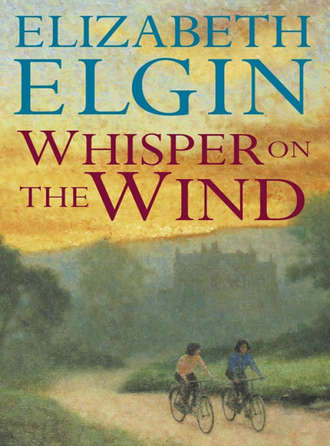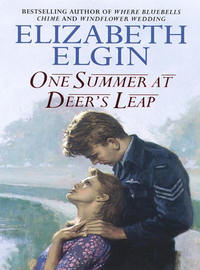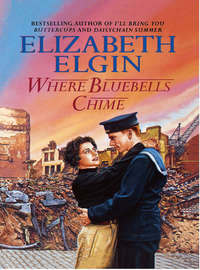
Полная версия
Whisper on the Wind
‘You’re taking it very calmly I must say.’ Polly sniffed.
‘What other way is there? Now tell me, what did young Arnie make of the bombing, yesterday?’
Arnie? They were talking about Arnie, now? The matter of Roz was closed.
‘Arnie? Oh, the young monkey enjoyed it. ’Twas all I could do to stop him racing off to see if he could find any pieces of shrapnel. You know what lads are like.’ She rose stiffly to her feet. ‘Ah, well. Think I’ll get the boiler going for the washing, then I’ll give the little sitting-room a bit of a going-over.’
She said it sadly, because things were out in the open, now. The problem was far from being solved, but at least it had been given an airing. It was a question of wait and see, and all because of the Mistress and her stiff-necked pride.
But waiting would do no good at all, because Roz was heading for trouble and heartache; Polly knew it, and she didn’t like it. Not one little bit!
6
The Peddlesbury raid was over and forgotten and a five-minute wonder, folk said, though they’d been shocked at the suddenness of it, with no time for the alert to be sounded. Nasty, how that Heinkel had managed to sneak in, but count your blessings, they said; no one hurt, this time. And the damage to the runway could easily be repaired, though not too quickly, Kath hoped, since Roz had said it was more the pity that all three bombs hadn’t dropped there, and made a proper job of it.
Today Roz was happy. Tomorrow Paul would return from leave and her world would be perfect – until the runway was seen to, that was, and the Lancasters able to take off again.
She must, Kath decided, include Paul in her Sunday prayers. Kath prayed often – a habit, really. Prayers all the time at the orphanage and obligatory church attendance during her in-service years – and in her own time, too. But her prayers held substance now, because she had someone of her own to spend them on: Barney and Roz and everyone at Home Farm. And Paul, too.
Funny how almost everyone went to church these days. It had taken a war to fill the churches, for now almost everyone had someone to commend to divine keeping; everyone had urgent need to beg the Almighty to choose between them and us, and let our side win.
She still regretted not being married in church. To Kath, a church wedding was more permanent somehow, but their small wedding-party would have seemed out of place in such a great loftiness. Only she and Barney there had been, and Barney’s reluctant mother and Sylvia who worked at the house next door, and Barney’s witness. The Registrar too, of course. Short and businesslike, their joining; a lonely wedding, really. Lonely, but legal.
But this was not a day to think too much on what might have been; this was a rare day that hinted of spring to come. This day was warm from the touch of a wind from the south and a sky so blue it could have been stolen from April. A weather-breeder Mat said it was, and not to be trusted.
Kath held her face to the sun, walking carefully with the near-full jug held between gloved hands.
‘Pop over with Marco’s drinkings, there’s a good lass,’ Grace had asked. ‘What with Jonty away to the farrier’s and Mat wasting his time at the War Ag. and Roz seeing to the calves –’ Best keep Roz and Marco apart as much as possible, Grace had long ago decided; best not upset the Mistress more than need be. ‘He’s working at the game-cover; take along a mug for yourself and have five minutes in the sun. Lord knows, it’ll likely be snowing tomorrow.’
The prisoner was working alone, cutting down the smaller, spindly trees in the little wood, dragging them clear with the tractor, stacking them against the time they could be chopped into logs and laid to dry for next winter’s burning.
‘Marco! How’s it coming along?’
‘I think we finish, on time. This scrub makes trouble, but we manage okay.’
‘Jonty said you’d drag the tree roots out with the tractor.’
‘Si. We fix a chain.’ Smiling, he took the mug she had filled for him. ‘You stay, Kat?’
‘For five minutes.’ She settled herself beside him. ‘Jonty’s taken Duke to the smithy to be shod. I asked him if he’d bring back one of the old shoes for me – for a souvenir, and for luck. In this country a horseshoe brings luck, you see.’
‘In my country, also. But this morning you smile, Kat. You have had a letter?’
‘No. Not for a week. I think I’m smiling because it’s such a lovely day.’
‘And tomorrow, maybe, a letter come and you smile some more.’
‘Well – at the moment I’m afraid I’m not looking forward to letters. I’m afraid that I – well, I deceived my husband, and –’
‘Deceive him? You have a lover?’
‘No! Nothing like that!’ Why had she started this conversation?
‘You tell him lies, then?’
‘Not even lies. I’m just not, I suppose, telling him the truth.’
‘There is a difference?’
‘There’s a difference, Marco.’ She had said too much; talked about things that should be private between man and wife, talked about them what was more to one who was an enemy. ‘Five minutes, Grace said. I’d better go. Bring the jug back later, will you?’
‘No, Kat. Wait!’ He took her hand and she didn’t know whether to snatch it away, or leave it. ‘You must tell me why you do not speak the whole truth. If you have sadness it is best you talk about it.’
‘All right, then.’ She took a deep, defiant breath. ‘When I write to my husband it isn’t what I write but what I don’t write. I don’t tell him things because he’d be annoyed with me. I haven’t told him about you, yet. I can’t, because he doesn’t like –’
She pulled in her breath sharply, wincing at her stupidity, closing her eyes tightly as if to block out the words.
‘He does not like Italians and I am Italian, and working here?’
‘Something like that.’
‘And?’ he prompted softly, his eyes on hers.
‘And I can’t tell him that Jonty isn’t in the forces; that a man so young is still a civilian. He thinks all young men should be called up.’
‘Your husband is a strange man, Kat.’
‘No! That isn’t true. It’s just that he feels strongly about things. And I’ve upset him, too, because I joined the Land Army without asking him. He doesn’t like to see women in uniform. Well, you wouldn’t like it either, would you?’
‘If I had a wife and she went to work in the fields for her country, I would be proud of her. Your man spends much time being angry. It is not good.’
‘No,’ she whispered, eyes downcast.
‘It is not good that he makes you sad; not good he does not trust you, though that is to be understood. He is jealous, you see, because his wife is beautiful and he fears other men will admire her.’
‘I’m not beautiful! I’m – oh, we shouldn’t be talking like this!’
‘No, we should not. This morning, you see, I have a letter from home. My mother is much sad. She writes that my cousin Toni is missing. Toni is a soldier, fighting in the desert. My aunt fears he is dead.’
‘Marco, I’m so sorry. Wars are wrong, and cruel!’ And that was a strange thing to come out with, wasn’t it, to one who was her sworn enemy. But what else was there to say – that they should have stayed out of the war, not thrown in their lot with the Germans nor invaded Abyssinia, either. But young men like Toni and Barney and Paul and Marco didn’t start the wars – only fought them. ‘I’m truly sorry,’ she whispered, ‘and especially for your aunt. My worries are nothing compared to hers.’
‘Si. Is called making a big hill from a little hill, yes?’
‘A mountain out of a molehill,’ she said, smiling gently. ‘And you will forget what I told you? It’ll work out. I know it will.’
He watched her walk away; watched her until she was out of sight.
‘If you were my wife, Katarina,’ he said softly, ‘I would treat you good. If you belonged to me –’
He shrugged and refilled his mug. She did not belong to him; she never would. She was a married English woman and he was Italian. They were enemies. It was as simple as that.
Roz whistled loudly and cheerfully.
‘Grace says you’ve had your tea, Kath, so can you give me a hand in the milking parlour? I’ve fed the calves and filled the trough in the foldyard. There’s only the mucking-out to do, then Mat might let us give the men a hand this afternoon. It’s such a lovely day to be outdoors.’
‘Marco could do with some help. He’s there alone. Will Jonty be long away?’
‘No. The smithy’s only half a mile the other side of the village. He’ll be back by dinnertime. Oh, Kath, this day is dragging so.’
‘When are you meeting Paul?’
‘Tomorrow night. God! I’ve missed him. I’m grateful he’s been away from flying, but it hurts like hell when he isn’t near me. Why isn’t it nineteen forty-four?’
‘Is that when the war’s going to end?’
‘Wish I knew. It’s Leap Year I’m talking about. That’s when I’ll propose to Paul, and he won’t be able to refuse me.’
‘Idiot! In nineteen forty-four you’ll be twenty-one, and no one can stop you marrying him. Which date in April is it?’
‘The twenty-fourth. St Mark’s Eve – or so Polly says.’
‘And does that make it special?’
‘Not really. It’s just that on St Mark’s Eve – oh, it’s a long story! I’ll tell you some other time. Let’s get the milking parlour brushed out and then we’ll have done a fair morning’s work for King and Country. Let’s work like mad, Kath, then tomorrow will come sooner. And just think – they’re saying it’ll be a week at least before they can use the runway again.’
‘Wonder why they’ve never thought to take off over the grass,’ Kath reasoned, ever practical, if they really had to, that is.’
‘Couldn’t be done, especially now with the ground so soft and wet. Those Lancasters weigh a lot. Bombed-up and with a full fuel load on they’d get bogged down if they tried it. Oh no, Kath. Paul’s off flying for another week, thank heaven, and if I’m being unpatriotic, then hard luck!’
Whistling, she picked up brush and shovel and Kath watched her go, eyes sad.
She’s so happy. Don’t let her get hurt. Please, God, look after Paul and Barney. And all husbands and sweethearts and sons.
Poor God. His ears must be ringing with prayers.
‘Roz. I think I’ve just done something stupid. It – it’s about Marco.’
‘Oh, yes. And what has Signor So-So been up to, then?’
‘That wasn’t kind, Roz, and he hasn’t done anything. It was me; something I said that I shouldn’t have.’
‘Like Italians go home?’
‘All right – if you don’t want to listen –’
‘I do. Tell me.’
‘Well – it was just that we got to talking about letters – and by the way, he’s had bad news from home about his cousin. Anyway, I mentioned that Barney got upset about women in uniform and young men who didn’t join up …’
‘Like Jonty?’
‘Yes. I haven’t told Barney about Jonty, you see, and if I told him about Marco, Lord knows what would happen. And as for telling him about what happened on threshing day – well –’
‘You’re afraid of him, aren’t you; you’re scared to tell him in case he gets upset, and nothing must upset Barney, must it? Queen Victoria’s been gone a long time, y’know. You should stand up to him.’
‘Roz, no! You’ve got it all wrong. Barney is good and kind – it’s just that he has strong views about certain things.’ She laid aside her brush and took a cigarette packet from the pocket of her dungarees. ‘Oh, let’s have a smoke! Go on, I can spare it. The WVS ladies came to the hostel last night and they let me have ten. No, it’s just that I want him to be proud of me for joining up, that’s all. I wanted to be a landgirl so much.’ Sighing, she struck a match.
‘And so he should be proud of you. But your trouble, Kath Allen, is that you think you owe Barney something for marrying you – but you don’t need me to tell you that, do you? And d’you know what I think you should do? I think you should take a long, smug look in a mirror, then tell that Barney of yours to grow up.’
‘Roz!’ Oh my goodness, hadn’t Marco said much the same thing?
‘I mean it, Kath. You could have married any man you wanted but you settled for someone like Barney. When are you going to accept that what happened when you were a baby wasn’t any of your fault? And that’s something else. You said you’d go to the Friday-night dances at Peddlesbury, and you haven’t been. Wouldn’t Barney like that, either?’
‘I honestly don’t know. Maybe it’s me. Maybe I feel it isn’t right for a married woman to go to dances without her husband; not right for me, that is. Yet there are married girls at the hostel who go and nobody bothers about it.’
‘So why don’t you come on Friday and meet Paul? You’d enjoy yourself, and a good night out with the girls might stop you feeling so guilty about nothing, or maybe,’ she grinned, ‘with a bit of luck it just might give you something to feel guilty about.’
‘You’re wicked, Roz Fairchild, and I’ll go to that dance, just to show you!’
‘Great. You’ll have a smashing time. The band’s really good and there’s loads of partners.’
‘You’ve persuaded me. I do like dancing and I miss not going. And as long as I’m wearing my wedding ring, I suppose it’ll –’
‘Oh, wear the thing through your nose if it’ll make you feel any happier, but come! Promise you will?’
‘Promise.’
‘And you don’t have to tell Barney, you know.’
‘The way he’s acting now,’ Kath tilted her chin defiantly, ‘I don’t think I will.’
‘Great! A bit of sense at last! But let’s get on with it. Leaning on shovels isn’t going to get this war won.’
Kath did not reply. She was thinking about the dance, wishing she’d thought to bring just one nice dress with her, and her dancing shoes. She could, of course, send stamps to Aunt Min and ask her to post them, but Aunt Min might want to know why she needed her gold slippers, and that would never do.
‘I think,’ she murmured, ‘that when I’m due for some time off, I’ll look out a few civvy clothes to bring back with me.’
Sneakily, of course. So Aunt Min wouldn’t know.
They were walking through the orchard when Kath saw the little white flower. It stood small and frail beneath the holly hedge.
‘Roz! A snowdrop. Isn’t it beautiful?’
‘It is, and a sure sign that winter’s on the way out. Think I’ll take it in for Gran – cheer her up.’ She bent to pick it carefully. ‘She’s been a bit quiet these last few days. I’ll put it in an egg cup in the kitchen window. Come in and say hullo. She’d like that.’
‘It was good of Mr Ramsden to let us help the men this afternoon, wasn’t it?’ Kath kicked off her boots at Ridings’ back door.
‘It was. He’s a lovely man.’
‘An older edition of Jonty, I suppose. They say,’ Kath murmured obliquely, ‘that when a man chooses a wife he should take a long, hard look at her mother, because that’s how his bride might look in about twenty-five years.’
‘Ah, but I don’t intend marrying Jonty, so it doesn’t apply, does it?’ Roz filled a blue and white egg cup with water. ‘And where is everybody? We could make off with the sugar ration and they’d be none the wiser. Still, can’t wait.’ She placed the little flower on the window sill. ‘Polly’ll think the little people have left it.’
Polly Appleby thought no such thing. They were only half way across Ridings’ cobbled yard when a cry of rage made them turn to see a blue and white egg cup being deposited on the doorstep.
‘Who was it, then?’ Polly pointed to the flower. ‘Who brought that thing into the house?’
‘But, Poll, it’s only a little snowdrop.’ Roz laughed.
‘Aye. One snowdrop. I thought you’d have had more sense, Roz Fairchild. Asking for trouble, that’s what. And the times I’ve told you!’
‘It was a surprise,’ Kath insisted, wondering at Polly’s dismay. ‘To cheer up Mrs Fairchild.’
‘Cheer her up? She can do with cheering up when you invite death into the house!’
‘Oh Lord, I’d forgotten,’ Roz whispered. ‘I really had, Poll. I’m sorry, I truly am.’
‘And so you ought to be.’
‘I’ll go and find another. Two would make it all right, wouldn’t it?’
‘Find as many as you will. The damage is done now, you foolish girl. Oh, be off with you. I’ll get rid of it. And next time just think on, will you? Your gran has enough to worry over without you adding to it.’
Indignantly Polly slammed the door; white-faced, Roz whispered, ‘How could I have been so stupid?’
‘But what did we do?’ Kath demanded. ‘A little flower; a pretty little flower and Polly gets herself all het up.’
‘A snowdrop – one snowdrop on its own – is bad luck brought into the house. Poll even goes so far as to say it’s a death sign, but she’s so superstitious you wouldn’t believe it.’
‘Well, I don’t believe it,’ Kath countered hotly. ‘I never heard of such a thing. One tiny flower, that’s all it was.’
‘I know. One. You can bring in two snowdrops, you can bring in a bunch, but one – never. I should have remembered.’
‘I’m surprised at you, I really am,’ Kath chided. ‘Of course a flower can’t bring death. I don’t believe it.’
‘Nor should I, but Gran does. The last time it happened my parents were killed before the year was out.’
‘And your grandfather?’
‘I don’t know about then. I only know I should have thought. But Polly believes what she calls the signs. Like the St Mark’s Eve thing. She swears that’s true, as well.’
‘St Mark’s Eve? You were going to tell me, weren’t you?’ Kath reminded.
‘Oh, forget it,’ Roz snapped. ‘It’s nonsense. Superstition, that’s all. For heaven’s sake, let’s get down to the men before the sun goes in. Let’s breathe in some clean, no-nonsense fresh air.’
‘But you’ve got me curious. I want to know.’
‘Later, I said,’ Roz ground. ‘We’ve had enough superstition for one day. Just leave it, okay? Lord, how I want Paul.’
How she wanted him, needed him. Needed his arms around her and his lips against her cheek telling her it was all right, that one small flower could harm no one.
‘Paul!’ she gasped, horrified. ‘It could be Paul!’
‘It could not be Paul; it will not be Paul. I helped you pick it, Roz, and I helped you put it in water and I’m not one bit afraid. Be reasonable, girl. Say the Lord’s prayer, or something. Say something holy and that’ll be the end of it. Go on. Do as I say, and it’ll be all right.’
‘You’re sure?’
‘I’m absolutely sure. Nothing’s stronger than Our Father …’
Closing her eyes, Roz did as she was told. Of course Kath was right and Polly was a silly, superstitious woman. One little flower? One pretty little flower?
‘Who was that?’ Hester Fairchild demanded, closing the kitchen door behind her, holding her hands to the fire. ‘Who were you talking to, Poll?’
‘Only Roz and Kath,’ she replied without looking up. ‘On their way to the game-cover. Just called, in passing.’
‘The game-cover. Why on earth do we call it that? There’s been no game in it since Martin died.’
‘There’s been partridge and a few wild pheasants and rabbits, too, though they’ll be gone, now. The girls are fetching some wood, so go easy on the coal; there’s bad weather ahead of us and you don’t want to face it with an empty coalhouse, now do you?’
The mistress of Ridings did not, and though she had resented the tearing out of the game-cover she knew full well that next winter there would be logs enough to warm the whole house. It would be something to look forward to, with coal so hard to come by.
‘They should ration coal,’ she murmured, frowning. ‘Ration it officially, that is, then we’d all know where we stood.’
‘Happen they should, at that.’ Polly was still upset about the snowdrop but she had managed to throw it away and wash out the egg cup before Hester came downstairs. ‘Happen they will. And I’ve seen to the water like Roz asked me. It’s in the white bucket outside.’
‘Water?’
‘Rainwater,’ Poll supplied. ‘From the backyard tub. She wants to wash her hair tonight.’
‘I see.’ So tonight would be the last of her granddaughter’s evenings at home. Tomorrow, it seemed, the airman would be back from leave and the untruths and prevarications would start all over again.
She walked to the window that overlooked the orchard and gazed at the yellow carpet of aconites and the pale green sheen that covered the hedge bottoms; the green that promised snowdrops soon to flower.
Once – last year, even – the sight would have given her happiness, but not any longer. To see the first stirrings of spring left an emptiness inside her because now it meant only another year to be endured. She was, Hester admitted, getting tired. Her love of living had ended with Martin’s death, but there had been a daughter to rear and a granddaughter, too; a granddaughter who had changed overnight, almost, from child to woman.
‘I’m lonely, Poll,’ she whispered. ‘Suddenly I’m so very lonely.’
‘Nay, ma’am, you’re weary. We all are. Sick and tired of this war and us never winning anything. There’s nothing the matter with any of us that some good news and a day free from worrying wouldn’t put right, and that’s a fact. So let’s make ourselves a pot of tea and be blowed to the rationing! Go on, ma’am. Put that old kettle on to boil, won’t you?’
‘Have you ever once wondered,’ Hester smiled, ‘what would happen if suddenly there was no tea?’
‘That I have. Many a time. And I came to the conclusion that if our tea ration dried up we’d just have to throw up our hands and give in.’
‘But we won’t, Poll?’
‘We won’t, Mrs Fairchild, ma’am. We won’t.’
Tuesday, beautiful Tuesday and only five minutes more until he came. Five long, lovely minutes, then he’d be here.
Roz waited, hands in pockets, coat collar upturned. Today was cold, yesterday’s little April forgotten. But the days were lengthening. Soon they would have to find some other place to meet. Soon, it would no longer be possible to wait, hidden by darkness, until she heard his footstep, his whistle.
Today she had seen catkins; not yet fat and fluffy and golden with pollen but her heart had beaten more quickly at the sight of them nevertheless. Today, everything was beautiful and precious, touched with their love; the gentle-eyed calves, fat little Daisy, the rooks, lazy wings flapping on the wind, and the daffodil tips, pushing out of the cold, wet earth.
She heard his footstep, then saw him as he turned into the yard. The sight of him set her pulses racing and she ran, not caring who might see them, into his arms, closing her eyes against the sweet, silly tears that sprang to them, lifting her face for his kiss.
‘Darling, I’ve missed you so.’ His voice was deep, husky with love.
‘Hey!’ She pulled away from him. ‘That’s what I always say!’ She reached for his lips with her own, wishing she didn’t feel so dizzy, so giddily happy. ‘I love you, love you, and I’ve missed you, too.’
‘I’m mad, aren’t I?’ His laugh was deep, and indulgent. ‘Why did I go? Why did you let me?’
‘Because I’m mad, too. Did you tell your parents about us?’
‘No, Roz. Mum would have gone into a dither about it and Dad would have given me a lecture on why a fighting man shouldn’t get serious about girls till the war’s over. I told Pippa, though. She was glad for us, though she gave me a stern, sisterly warning.’
‘It’s all right. I’m not pregnant. I told you so, when you rang.’ She was glad Paul’s sister knew about them; that someone knew they’d been lovers. ‘And did I tell you I love you?’
‘You did, but say it again. Don’t ever stop saying it, Roz.’
‘I won’t. Not ever. Fifty years from now I’ll still be telling you.’
He held her tightly. Fifty years from now. She said it often, tilting at Fate, defying it to part them. Fifty years, my lovely love? Fifty weeks, fifty days he’d be grateful for. He closed his eyes, resting his cheek on her hair, grateful to a war that had brought them together, hating a war that could snatch them apart without a goodbye.







